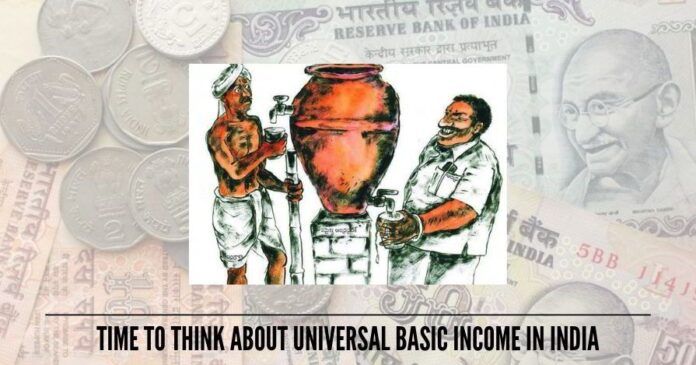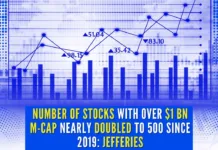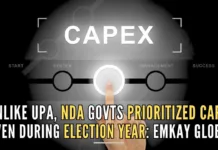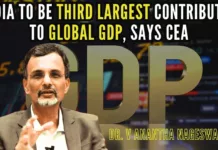
The meaning of ‘basic income’ can be construed as programmes in which payments are high enough to meet basic living expenses.
A piece of recent significant news is that tax on superrich can fund Rahul Gandhi’s NYAY, as said by World Inequality Lab, a Paris based organization. Under simple assumptions, a 2% tax on total wealth on households owning more than Rs. 2.5 crore of wealth (the top of 0.1% of households), would yield Rs. 2.3 trillion or 1.1% of GDP. Guaranteeing a minimum income of Rs. 72000 to households with an income of Rs. 12000 or less would cost Rs. 2.9 trillion or 1.3% of GDP in 2020, the World Inequality Lab said in a report.
According to N Chandra Mohan in Hindustan Times (January 10, 2017), taking out all subsidies, reducing unnecessary tax exemptions, taxing agricultural incomes among other measures frees up resources up to 10 percent of the GDP annually.
Another report, ‘The Widening Gaps: India Inequality Report 2018’, alleges that the wealthiest individuals in India (it pegs the total wealth of Indian billionaires at 15 percent of the GDP, has risen from 10 percent only five years ago) have cornered a large share of their wealth through ‘crony capitalism’ and inheritance, while people at the bottom have been seeing their share reduced further. The report pointed out that the path of inequality has changed in India — from being stagnant in the 1980s to increasing since 1991 and to a subsequent and continued surge up to the present.
The Organisation for Economic Co-operation and Development suggests that reducing inequality through tax and transfer policies does not harm growth, so long as the chosen policies are well designed and implemented. They argue that redistribution efforts should focus on families with children and youth, and improvements in human capital investment by the promotion of skills development and learning. Governments can intervene to promote equity and reduce inequality and poverty, through the tax and benefits system. This means employing a progressive tax and benefits system which takes proportionately more tax from those on higher levels of income and redistributes welfare benefits to those on lower incomes. It can support sectoral training, apprenticeships, and earn-while-you-learn programmes; maintain and strengthen safety net programs such as welfare, unemployment benefit, universal healthcare, homeless shelters, and sometimes subsidized services such as public transport, which prevent individuals from falling into poverty beyond a certain level.
The concept of Universal basic income (UBI) is a sum of money provided by the state to all citizens to take care of their bare necessities of life. This measure is intended to provide a safety net, preventing any citizen from sinking below a basic minimum standard of living. The argument for a basic income for all is not only in the interest of the poor but also in the interest of the rich to maintain social order and rule of law. In China, there is already a kind of minimum livelihood guarantee, set at different levels in urban and rural areas, that adds to the incomes of those categorized as poor so that they reach a certain minimum. Thomas Paine was among the first to argue that a basic income should be introduced as a kind of compensation for dispossession. Hence, the meaning of ‘basic income’ should be construed as programmes in which payments are high enough to meet basic living expenses.
With protectionism resurfacing all around and to fight the recessionary trend, it is necessary to boost domestic consumption demand. UBI will mostly go to the poor and rural segment where marginal propensity to consume is high and therefore consumption demand will substantially go up.
But how can it be funded in India? One answer has been provided by World Inequality Lab as detailed in the 2nd paragraph. Also, according to N Chandra Mohan in Hindustan Times (January 10, 2017), taking out all subsidies, reducing unnecessary tax exemptions, taxing agricultural incomes among other measures frees up resources up to 10 percent of the GDP annually. If we take out 3.5 percent of GDP for UBI, this would entail Rs 5.32 lakh crore which is double the budgeted subsidy bill for 2016-17. Even otherwise, consequent and subsequent to demonetization, tax accrual has substantially gone up and, therefore, funding of a none too ambitious programme for meeting minimum basic needs should be possible. And proper distribution is possible through the Direct Benefits Transfer method.
Note:
1. The views expressed here are those of the author and do not necessarily represent or reflect the views of PGurus.
- The real Parivartan is to be ushered in now. - March 23, 2021
- When will the truth dawn on Bengalis? - March 13, 2021
- The many arguments of anti-Modi intellectuals - November 5, 2020











Does UBI mean free gift to an unspecified number of people who are eligible to earn a lively hood but unemployed ? Free gifts encourages unwillingness to make an effort to earn ,instead, encourages political groupings and inaction.
Taxing the rich beyond the max.limit is an ever increasing economic outlook but at the end resulting in spiralling price rise / inflation and ,hence, an ever increasing demand for more UBI allocation.
Better way to deal with the situation is to
Free 10per cent of GDP as suggested and allocate the money to all undeveloped /under developed districts of India in three categories according to specific districts potential under the heads 1)agriculture 2) industry 3) resource delopment and service
If 10percent of GDP is freed for these purposes , each of the around 590 districts of India will get 30,000 crore budgetary allocation (appx.) and will be empowered for self development
Rising population is a huge concern which needs to be dealt with properly. America with 4 times the area of India and one fourth the population has a natural 16 times advantage. Similarly China has three times the advantage as to land area.
.Ultimately , it is human beings who will develop the country.They need to make economic contribution for growth. Mere politics for vote will result into a nation without backbone
enlightening thoughts.
out of box thinking- S. Gurumurthy- thinker- discovered- charecteristic behaviors of a Indian household- found that women run them- savings is a dominant integral element in household wealth- additional streams of income generate greater savings-it spreads across all household segments- this chareteristic has prevailed through out in post independent India.
He expressed that most of the increased savings find their way to investment capital through the financial institutions- lending protocol become critical- currently very lose parameters applied;
So where does basic income fall-given that households are savings centric- as oppose to consumption centric;
basic income- original intent – welfare payments reform.
savings today- is for future consumption.
If there is apolitical will- basic income- whatever amt it may be-when broader discussion prevail- among relevant agencies, government and non governmental think tanks and public at large- begin to see the two sides of the balance sheet- inflows and outflows, effiicacy, potential outcomes, expectations- in INDIAN context.
Sustaining the growth of the Indian economy- expanding streams of income- help sustain economic growth.
Definition of basic income- applied to every man,woman and child vs household;
Definition of household- how many make a household.
So many more variable can apply to this discussion.
Clear focus on intent, definition, process, delivery, monitoring, efficacy, potential vs actual intended and unintended outcomes/expectations, willing to make improvements;
I believe there is a income safety net in place for a poor segment of population- through direct transfers- which one of you have mentioned. what has been the research on planned outcomes vs actual outcomes? and other variables that may apply.
I believe we are a $5 Trillion economy now, and $10 Trillion can happen sooner than we expect; We are on trajectory to pass US sooner than we expect as well. Proviso- yearly GDP expand by minimum average 9-10% over the next 10-15 yrs- educated guesstimates and doable; closing in on corruption- at every level-can help contribute to the expansion.CORRUPTION IS A ECONOMIC COST- WHETHER YOU SEE IT OR NOT.
# Time to rewind ! Rahul Gandhi’s Grandma’s slogans ! ” Garibi Hatao ; 20 Point Programme ; Self-Reliance ; and, Protected. Water Supply, etc,.”
Dear Editor,
I not sure why such articles are being written.
Our age old wisdom says anyone given free anything will only spoil that person. Same thing is applicable here also.
As some one said here, MNREGA removed labourer from Farming and in fact made the farmers life more difficult. The farmer pays same cost of per day for 3 to 4 hrs of work post MNREGA. To fix that, MNREGA should be linked to Farming activity also. The farmer could pay a cost and govt could ensure minimum wages to farm labourer.
This way there could be a reasonable gain both sides.
Now if we say minimum income scheme who will show interest to work?
Now our ancient wisdom also says a king should not levy taxes more than 1/16th of the earning and made the a person take care of his or her kith and kin. Established importance to all relatives by inclusiveness in every celebrations. The people were bonded by respect and value system to establish order. This provided an assurance for kids, older people and also special need people such as mentally retarded etc.
Instead of going to lesser tax and more compliance as well as more responsibilities transferred to individual if the Govt tax more, there will be evasion, hoarding and corruption at all levels.
People should ask for lesser tax and more responsibilities rather than freebies.
This will also cripple the enterprise in our people and bring down our economy
I value high of you do not write or allow such articles here
The incumbent BJP has announced this 6000 p.a to the farmers are to compensate with the untimely loss and also in lieu of huge subsidy. These popular Scheme seldom works as reported in TOI. Sugarcane formers of the Western UP are suffering due to the steep rise in MSP but the mills are not able to sell the sugar at a correspondingly higher rate. So, they are also in trouble. This world is meant only business hence we need to look everything at asset creation, like the new MNREAGA. Creation of Assets results in creation of jobs. Need to streamline the Jobs data, so that we will understand that the situation is that alarming as we think it is.
The NYAY is a brahmastra. It will be perilous for Modi/BJP to ignore it.
It could have been a brahmastra. people don’t trust Rahul Gandhi.Problem is not with the scheme as a vote catching mechanism but with the trustworthiness of the executor.Else it could have caused havoc.
Actually, it is very easy and can be done through NREG Scheme! Rather than giving money for no work the same money should be given for Constructive works. Monthly Rs. 6000/- or yearly Rs. 72000/- can be given through 200 day work scheme in NREGS from current 100 day with daily wage of Rs. 360/- which is also equivalent to minimum wage act. Now the fund can be created by stopping all other subsidies on various poverty alleviation programs of Govt
Actually, it is very easy and can be done through NREG Scheme! Rather than giving money for no work the same money should be given for Constructive works. Monthly Rs. 6000/- or yearly Rs. 72000/- can be given through 200 day work scheme in NREGS from current 100 day with daily wage of Rs. 360/- which is also equivalent to minimum wage act.
Now the fund can be created by stopping all other subsidies on poverty alleviation programs
The ill effects MGNERGA is evident in Kerala. Huge tracts of land remains fallow, uncultivated. With the twin benefits of MGNERGA and free food grain supply by the state government, agricultural labour enjoys free time afforded by MGNERGA. One can see troops of people scratching out earth, amid enjoying tea and snacks. The day starts late and closes early under MGNERGA. The economists singing it’s praise should look at the combined effect free grain by state government and no work under MGNERGA. If there was ever a stupid, utterly idiotic program which saps public resources it is this.